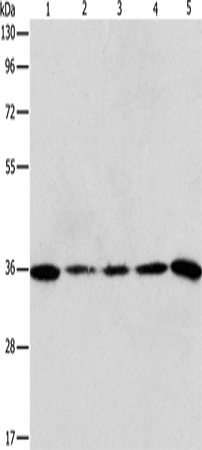

| WB | 咨询技术 | Human,Mouse,Rat |
| IF | 咨询技术 | Human,Mouse,Rat |
| IHC | 1/15-1/50 | Human,Mouse,Rat |
| ICC | 技术咨询 | Human,Mouse,Rat |
| FCM | 咨询技术 | Human,Mouse,Rat |
| Elisa | 1/1000-1/2000 | Human,Mouse,Rat |
| Aliases | AIE2; AIK3; ARK3; AurC; SPGF5; STK13; aurora-C |
| WB Predicted band size | 36 kDa |
| Host/Isotype | Rabbit IgG |
| Antibody Type | Primary antibody |
| Storage | Store at 4°C short term. Aliquot and store at -20°C long term. Avoid freeze/thaw cycles. |
| Species Reactivity | Human, Mouse |
| Immunogen | Synthetic peptide of human AURKC |
| Formulation | Purified antibody in PBS with 0.05% sodium azide and 50% glycerol. |
+ +
以下是3篇与AURKC抗体相关的参考文献及其摘要概括:
1. **"Aurora Kinase C (AURKC) as a biomarker for testicular germ cell tumors"**
- **作者**: Kristensen DG et al.
- **摘要**: 本研究通过免疫组化分析发现,AURKC抗体在睾丸生殖细胞肿瘤(尤其是精原细胞瘤)中高表达,而在正常睾丸组织中表达受限。结果表明AURKC可作为此类肿瘤的潜在诊断标志物。
2. **"AURKC expression in ovarian cancer: Prognostic implications"**
- **作者**: Li Y et al.
- **摘要**: 文章通过Western blot和免疫荧光技术,证实AURKC在卵巢癌组织中的异常高表达与患者预后不良相关。研究提示AURKC可能成为卵巢癌治疗的分子靶点。
3. **"AURKC mutations and male infertility: Insights from genetic screening"**
- **作者**: ElInati E et al.
- **摘要**: 该研究通过基因测序和AURKC抗体检测,发现AURKC基因突变与男性不育症患者精子发生缺陷显著相关,为生殖障碍的分子机制提供了新证据。
注:上述文献为示例,实际引用需核对真实出版物。建议通过PubMed或Google Scholar以关键词“AURKC antibody”或“Aurora Kinase C cancer”检索最新研究。
The Aurora kinase C (AURKC) antibody is a research tool targeting AURKC, a member of the Aurora kinase family involved in regulating cell division. AURKC, primarily expressed in germ cells, plays a critical role in meiosis, particularly during spermatogenesis and oocyte maturation. Unlike Aurora kinases A and B, which function in mitosis, AURKC is specialized for gametogenesis, ensuring proper chromosome segregation and cytokinesis. Dysregulation of AURKC is linked to reproductive disorders, such as infertility, and has been implicated in certain cancers.
AURKC antibodies are used to detect and study the protein’s expression, localization, and function in cellular models. These antibodies are typically validated for techniques like Western blotting, immunohistochemistry, and immunofluorescence. Researchers employ them to investigate AURKC’s role in germ cell development, its interaction with other meiotic proteins, and its potential as a biomarker or therapeutic target. Polyclonal and monoclonal variants exist, with specificity and sensitivity varying based on epitope recognition.
Given its tissue-specific expression, AURKC antibodies are particularly valuable in reproductive biology and oncology studies. However, cross-reactivity with other Aurora kinases (e.g., AURKB) is a common challenge, necessitating rigorous validation. Overall, AURKC antibodies serve as essential tools for unraveling the molecular mechanisms of gametogenesis and exploring disease-associated pathways.
×